Monthly Updates on Recent Books in the History of Christianity
To raise awareness of recent books in the history of Christianity, the editorial staff of Church History: Studies in Christianity and Culture highlights each month a list of 10-15 books in diverse periods and geographical regions that we hope will be of interest to our members. We include here below the 38th monthly list, chosen by our staff, with excerpts from the publishers’ blurbs.
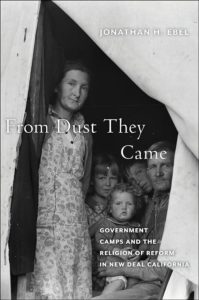
Jonathan H. Ebel, From Dust They Came: Government Camps and the Religion of Reform in New Deal California. 2023
In the midst of the Great Depression, punished by crippling drought and deepening poverty, hundreds of thousands of families left the Great Plains and the Southwest to look for work in California’s rich agricultural valleys. In response to the scene of destitute white families living in filthy shelters built of cardboard, twigs, and refuse, reform-minded New Deal officials built a series of camps to provide them with shelter and community.
Using the extensive archives of the federal migratory camp system, From Dust They Came tells the story of the religious dynamics in and around migratory farm labor camps in agricultural California established and operated by the Resettlement Administration and the Farm Security Administration. Jonathan H. Ebel makes the case that the camps served as mission sites for the conversion of migrants to more modern ways of living and believing. Though the ideas of virtuous citizenship put forward by the camp administrators were framed as secular, they rested on a foundation of Protestantism. At the same time, many of the migrants were themselves conservative or charismatic Protestants who had other ideas for how their religion intended them to be.
By looking at the camps as missionary spaces, Ebel shows that this New Deal program was animated both by humanitarian concern and by the belief that these poor, white migrants and their religious practices were unfit for life in a modernized, secular world. Innovative and compelling, From Dust They Came is the first book to reveal the braiding of secularism, religion, and modernity through and around the lives of Dust Bowl migrants and New Deal reformers.
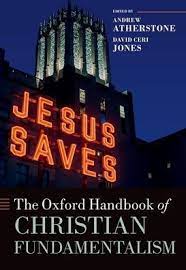
Andrew Atherstone and David Ceri Jones, eds. The Oxford Handbook of Christian Fundamentalism. 2023
Christian fundamentalism is a significant global movement which originally took its name from The Fundamentals, a series of booklets defending classic evangelical doctrines, published in the 1910s. The Oxford Handbook of Christian Fundamentalism traces the roots of fundamentalism from the late nineteenth century and explores the development of the movement up to the present day. Since its inception, fundamentalism has proved a highly contested category. By some the label is recognised as a badge of honour, by others a term of abuse. This volume does not offer a simple definition of fundamentalism. Rather, it acknowledges its many interpretative and definitional complexities, and allows multiple identities to jostle together under the 'fundamentalist' label. The boundaries are porous between fundamentalism and conservative evangelicalism, so the Handbook includes analysis of some conservative expressions of Christianity which show fundamentalist characteristics, even in groups which refuse to define themselves as 'fundamentalist'. The relationship of fundamentalism to Pentecostalism and charismatic renewal is also explored in detail.
Research-led chapters cover significant historical developments, key doctrines such as biblical inerrancy, creationism and separatism, and an extensive range of moral and cultural issues to which the contribution of fundamentalism has been significant, including popular music, alcohol, sport, and family life. Contributors also chart the evolution of the movement globally--far beyond its North Atlantic origins. Recognising the prominence of fundamentalism beyond the Church, the Handbook explores its contribution to public debates concerning political influence, education, human genetics, civil rights, business, global warning, sexuality, Israel and the Middle East, the shaping of contemporary culture, and much else. Christian fundamentalism, this Handbook ultimately shows, is one of the most significant movements operating in today's world.
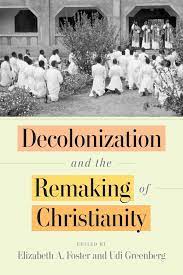
Elizabeth A. Foster and Udi Greenberg, ed. Decolonization and the Remaking of Christianity. 2023
University of Pennsylvania Press
In the decades following the era of decolonization, global Christianity experienced a seismic shift. While Catholicism and Protestantism have declined in their historic European strongholds, they have sustained explosive growth in Asia, Latin America, and Africa. This demographic change has established Christians from the Global South as an increasingly dominant presence in modern Christian thought, culture, and politics.
Decolonization and the Remaking of Christianity unearths the roots of this development, charting the metamorphosis of Christian practice and institutions across five continents throughout the pivotal years of decolonization. The essays in this collection illustrate the diverse new ideas, rituals, and organizations created in the wake of Western imperialism’s formal collapse and investigate how religious leaders, politicians, theologians, and lay people debated and shaped a new Christianity for a postcolonial world.
Contributors argue that the collapse of colonialism and broader cultural challenges to Western power fostered new organizations, theologies, and political engagements across the world, ultimately setting Christianity on its current trajectory away from its colonial heritage. These essays interrogate decolonization’s varied and conflicting impacts on global Christianity, while also providing a novel framework for rethinking decolonization’s modern legacies. Taken together, this book charts the relationship between decolonization and Christianity on a truly global scale.
Contributors: Joel Cabrita, Darcie Fontaine, Elizabeth A. Foster, Udi Greenberg, David Kirkpatrick, Eric Morier-Genoud, Phi-Vân Nguyen, Justin Reynolds, Sarah Shortall, Lydia Walker, Charlotte Walker-Said, Albert Wu, Gene Zubovich.
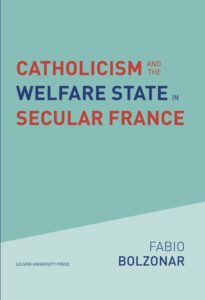
Fabio Bolzonar, Catholicism and the Welfare State in Secular France: Continuities and Changes in the Catholic Mobilizations in the Social Policy Domain (1940-2017). 2023
Even though the policy impact of Catholicism has increasingly been acknowledged, existing scholarship lacks a coherent view on its changing influence over time and in different political contexts. In this book, Fabio Bolzonar investigates the influence of Catholicism on developments in French social protection from World War II to the mid-2010s. He discusses the factors that have favoured or inhibited it and explores the hybridization between Catholic values and secular principles in the social engagement of Catholic actors in secular France. By doing so, this multidisciplinary study integrates current scholarship, which has given limited attention to the changing patterns of Catholic involvement in the social policy domain over a long period of time, and the renewed influence of Catholic values in secularized societies.
Catholic mobilization has relocated from the political to the civil society sphere, making voluntary organizations and social movements, rather than political parties, the main channels for defending Catholic values in secular France. Rather than marginalizing Catholicism, this process has opened up new opportunities for Catholic actors and values to play a significant role in society and politics. Bolzonar identifies two divergent scenarios that define Catholic social engagement in contemporary France: either the strengthening of new forms of institutional collaboration between Catholic-inspired philanthropic organizations and public administrations in the interest of socially vulnerable citizens, or the emergence of new ideological conflicts on gender- and sexuality-related issues.
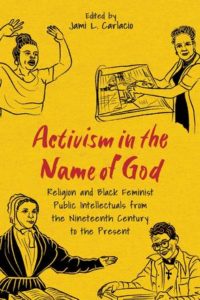
Jami L. Carlacio, Activism in the Name of God: Religion and Black Feminist Public Intellectual from the Nineteenth Century to the Present. 2023
University Press of Mississippi
Activism in the Name of God: Religion and Black Feminist Public Intellectuals from the Nineteenth Century to the Present recognizes and celebrates twelve Black feminists who have made an indelible mark not just on Black women’s intellectual history but on American intellectual history in general. The volume includes essays on Jarena Lee, Theressa Hoover, Pauli Murray, and Alexis Pauline Gumbs, to name a few. These women’s commitment to the social, political, and economic well-being of oppressed people in the United States shaped their work in the public sphere, which took the form of preaching, writing, singing, marching, presiding over religious institutions, teaching, assuming leadership roles in the civil rights movement, and creating politically subversive print and digital art. This anthology offers readers exemplars with whose minds and spirits we can engage, from whose ideas we can learn, and upon whose social justice work we can build.
The volume joins a burgeoning chorus of texts that calls attention to the creativity of Black women who galvanized their readers, listeners, and fellow activists to seek justice for the oppressed. Pushing back on centuries of institutionalized injustices that have relegated Black women to the sidelines, the work of these Black feminist public intellectuals reflects both Christian gospel ethics and non-Christian religious traditions that celebrate the wholeness of Black people.
Contributors: Janet Allured, Lisa Pertillar Brevard, Jami L. Carlacio, Cheryl J. Fish, Angela Hornsby-Gutting, Jennifer McFarlane-Harris, Neely McLaughlin, Darcy Metcalfe, Phillip Luke Sinitiere, P. Jane Splawn, Laura L. Sullivan, and Hettie V. Williams
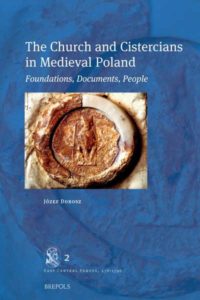
Józef Dobosz, The Church and Cistercians in Medieval Poland: Foundations, Documents, People. 2023
In this volume, the research of Józef Dobosz, one of Poland’s leading historians of the Middle Ages, is made accessible in English for the first time. It brings together nineteen studies focused on the role of the Church, the Cistercian Order, and other religious institutions in the history of the Piast realm from which Poland emerged. The introduction offers a broad outline of the first two centuries of the rule of the Piast dynasty after the Baptism of Poland in 966 until the fragmentation of the Piast patrimony during the twelfth century. The subsequent essays examine the circumstances of the foundation of Poland’s leading Cistercian monasteries in Sulejów, Jędrzejów, Wąchock, Owińska, and Łekno. The author analyses the means of their establishment, evaluates the existing sources, and places these within the context of the Piast dynasty’s economic, political, and social policies.
The studies offer an in-depth analysis of the motivations of the leading dynasts, magnates, and prelates in supporting the mission of the Church in Poland and enabling further embedding of Christianity across all strata of the society. The author examines the oldest Polish documents related to Cistercian monasteries and canons regular (in particular foundation charters) including early medieval charter forgeries. The volume’s key conclusions about the impact of Christianity on nascent Poland are based on a detailed examination of medieval charters, the role of scriptoria, identities of significant people of the Church, and the wider historical record.
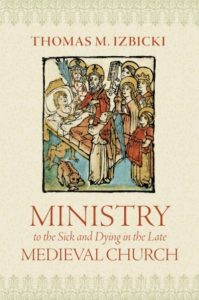
Thomas M. Izbicki, Ministry to the Sick and Dying in the Late Medieval Church. 2023
Catholic University of American Press
The focus of this volume is on ministry to the sick and dying in the later Middle Ages, especially providing them with the sacraments. Medieval writers linked illness to sin and its forgiveness. The priest, as physician of souls, was expected to heal the soul, preparing it for the hereafter. His ministry might also effect healing of bodies, when that healing did not endanger the soul. This book treats how a priest prepared to visit sick persons and went to them in procession with the Eucharist and oil of the sick. The priest was to comfort the patient and, if death was imminent, prepare the soul for the hereafter. Canon law, theology, and ritual sources are employed. Three sacraments, penance, viaticum, (final communion) and extreme unction (anointing of the sick) are treated in detail. Sickbed confession was designed to forgive the ailing person's mortal sins. A priest could absolve a dying person of all sins, even those reserved to a bishop or the pope. Viaticum was to strengthen a suffering Christian for life's last conflict, that between angels and demons for the soul of the dying person. The deathbed thus was a spiritual battlefield. Extreme unction was reserved for those in danger of death, relieving the soul of venial sins or "the remains of sin," even after confession and absolution. The commendatio animae (commendation of the soul) used with the dying was to usher the soul into the afterlife. Many works have been written about attitudes toward death, dying, and the afterlife in the Middle Ages. Likewise, there is a good deal of literature about individual sacraments. This study aims at bridging between these literatures, with a focus on the priest and parishioner in both theory and practice at the sickbed.
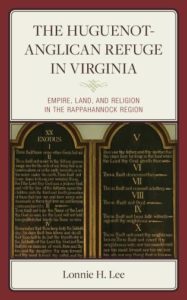
Lonnie H. Lee, The Huguenot-Anglican Refuge in Virginia: Empire, Land, and Religion in the Rappahannock Region. 2023
Lexington Books/Fortress Academic
The Huguenot-Anglican Refuge in Virginia is the history of a Huguenot emigrant community established in eight counties along the Rappahannock River of Virginia in 1687, with the arrival of an Anglican-ordained Huguenot minister from Cozes, France named John Bertrand. This Huguenot community, effectively hidden to researchers for more than 300 years, comes to life through the examination of county court records cross-referenced with French Protestant records in England and France. The 261 households and fifty-three indentured servants documented in this study, including a significant group from Bertrand’s hometown of Cozes, comprise a large Huguenot migration to English America and the only one to fully embrace Anglicanism from its inception. In July 1687 a French exile named Durand de Dauphiné published a tract at The Hague outlining the pattern and geography of this migration. The tract included a short list of inducements Virginia officials were offering to attract Huguenot settlers to Rappahannock County. These included access to French preaching by a Huguenot minister who would also serve an established Anglican parish, and the availability of inexpensive land. John Bertrand was the first of five French exile ministers performing this dual track ministry in the Rappahannock region between 1687 and 1767.
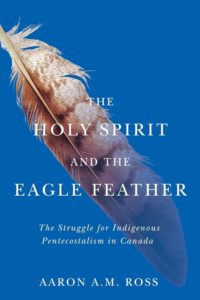
Aaron A. M. Ross, The Holy Spirit and the Eagle Feather: The Struggle for Indigenous Pentecostalism in Canada. 2023
McGill-Queen’s University Press
Pentecostalism is one of the fastest-growing religious movements in the world. In Canada, it is the most rapidly growing Christian group among Indigenous people, with approximately one in ten Pentecostals in the country being Indigenous. Pentecostalism has become a religious force in many Indigenous communities, where congregations are most often led by Indigenous ministers - an achievement that took many decades.
The Holy Spirit and the Eagle Feather traces the development of Indigenous Pentecostalism in Canada. Exploring the history of twentieth-century missionization, with particular attention to the Pentecostal Assemblies of Canada’s Northland Mission, founded in 1943, Aaron Ross shows how the denomination’s Euro-Canadian leaders, who believed themselves to be supporters of Indigenous-led churches, struggled to relinquish control of mission management and finances. Drawing on interviews with contemporary figures in the movement, he describes how Indigenous Pentecostals would come to challenge the mission’s eurocentrism over decades, eventually entering positions of leadership in the church.
This process required them to confront the painful vestiges of colonialism and to grapple with the different philosophies and theologies of Pentecostalism and Indigenous traditional spiritualities. In doing so they indigenized the movement and forged a new identity, as Indigenous and Pentecostal. Indigenous Pentecostals now occupy key roles in the church and serve as political, cultural, and economic leaders in their communities. The Holy Spirit and the Eagle Feather tells the story of how they overcame the church’s colonial impulses to become religious leaders, as well as agents for decolonization and reconciliation.
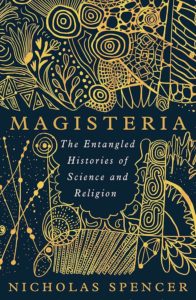
Botros K. Sadek, Cyril ibn Laqlaq’s Book of Confession: A Critical Edition and Annotated Translation with an Introduction. 2023
Cyril ibn Laqlaq’s Book of Confession offers the critical edition and translation of a treatise that is published here for the first time. Cyril, the 75th Coptic Patriarch, was a controversial figure who was judged for simony by his own bishops in an official synod. Despite his failure to promote auricular confession during his lifetime, the widespread distribution of his treatise had a significant impact on the practice's adoption. The Book of Confession is well attested in the manuscript tradition. The vast inventory of manuscripts attests to its popularity among diverse Christian denominations throughout the Middle East. Undoubtedly, it has been a highly influential text in the formation of spiritual life and penitential theology in the Middle Ages.
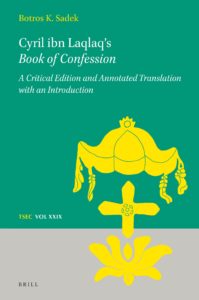

Scott Ables, ed. John of Damascus: More than a Compiler. 2023
John of Damascus, the eighth century theologian of the newly re-established Jerusalem Patriarchate, remains understudied because many consider him no more than a compiler of tradition, saying nothing original. We challenge this misconception by exploring ways in which John made his sources his own, his reception history, his biography, his philosophic appropriation and unique contribution, how he presented his theology in locally significant ways, his influence on subsequent generations, and all his varied theological output in both its historical context and as received in Byzantine tradition.
Ran Segev, Sacred Habitat: Nature and Catholicism in Early Modern Spanish Atlantic. 2023
Pennsylvania State University Press
Known as a time of revolutions in science, the early modern era in Europe was characterized by the emergence of new disciplines and ways of thinking. Taking this conceit a step further, Sacred Habitat shows how Spanish friars and missionaries used new scholarly approaches, methods, and empirical data from their studies of ecology to promote Catholic goals and incorporate American nature into centuries-old church traditions.
Ran Segev examines the interrelated connections between Catholicism and geography, cosmography, and natural history—fields of study that gained particular prominence during the sixteenth and seventeenth centuries—and shows how these new bodies of knowledge provided innovative ways of conceptualizing and transmitting religious ideologies in the post-Reformation era. Weaving together historical narratives on Spain and its colonies with scholarship on the Catholic Reformation, Atlantic science, and environmental history, Segev contends that knowledge about American nature allowed pious Catholics to reconnect with their religious traditions and enabled them to apply their beliefs to a foreign land.
Sacred Habitat presents a fresh perspective on Catholic renewal. Scholars of religion and historians of Spain, colonial Latin America, and early modern science will welcome this provocative intervention in the history of empire, science, knowledge, and early modern Catholicism.
Finally, for staying up-to-date on the latest titles in all fields, we recommend regularly perusing New Books Network and its "New Books in Christian Studies” page. These pages are updated regularly.
